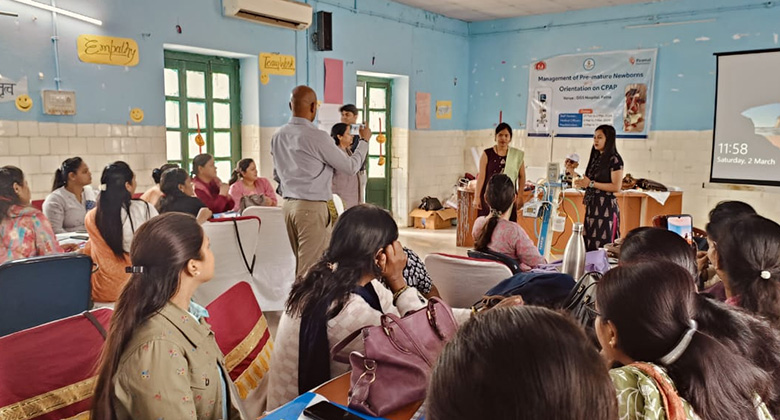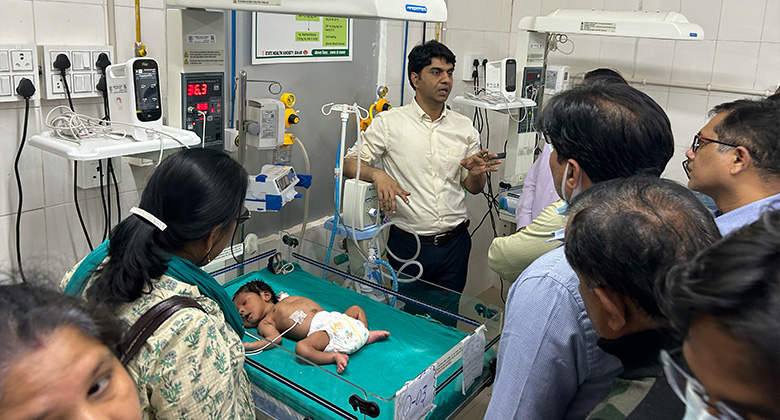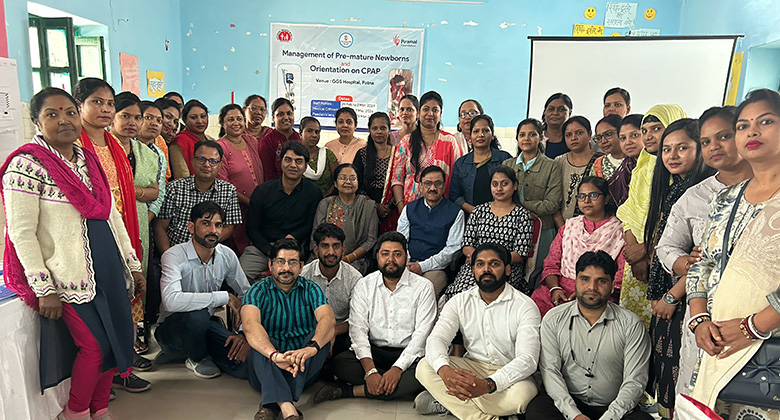In a small but vital step towards enhancing neonatal healthcare in Bihar, a remarkable chapter has unfolded through the collaborative efforts of the State Health Society Bihar (SHSB) and the Piramal School of Leadership’s School of Health (PSL-SOH). This initiative exemplifies a robust commitment to enhance the technical skills of healthcare professionals, underscored by a profoundly compassionate approach to delivering superior healthcare services.
Over nine transformative days of technical skill development, the corridors of Bihar's healthcare landscape witnessed a convergence of expertise and dedication. The PSL-SOH orchestrated a workshop tailored for the capacity building of Paediatricians, Medical Officers, and Staff Nurses from all 35 Special Newborn Care Units (SNCUs) at the District Hospital in Bihar. Each group of Health professional were trained at the state level for 3 days at Guru Govind Singh (GGS) Hospital Patna. This wasn't merely a capacity-building event; it was a strategic investment in nurturing leaders who would champion change within their respective units and save the lives of neonates further in Bihar. Through meticulous selection, the PSL-SOH and the State Health Society, Bihar (SHSB), ensured that the best and brightest from each SNCU were represented. These chosen individuals weren't just participants; they were entrusted with a mantle of leadership, poised to cascade the knowledge and protocols gleaned from the workshop to their peers.

PSL-SOH, collaborating with SHSB, achieved success in operationalizing 10 CPAP (Continuous Positive Airway Pressure) machines within SNCU of GGS Hospital prior to the stated skill-development session, facilitating hands-on practice for the SNCU staff and instilling motivation among them to utilize the equipment for the care of sick newborns. The overwhelming response spoke volumes about the dedication of Bihar's healthcare providers. With a staggering 97% (102 participants - 38 Paediatricians, 29 Medical officers & 35 Staff nurses) participation rate ever, including enthusiastic representation from districts, the workshop garnered accolades from the Health Department, Govt. of Bihar, and Development Partners alike. It was a testament to the unwavering commitment to excellence pulsating within Bihar's healthcare ecosystem.
Subject matter experts from renowned institutions such as AIIMS, NMCH, and PSL-SOH contributed their expertise to enhance the technical capacity of the training, focusing on critical areas for the management of prematurity and sick newborns. A pre-test was administered to SNCU staff to identify gaps in their knowledge and current practices. The three-day workshop content was developed based on basic protocols, revised protocols, advanced techniques like CPAP use, mentoring visit findings and case discussions to upgrade the knowledge of SNCU staff, enabling them to provide more effective health services.
Key focus areas included Golden Hour management strategies, prematurity, respiratory distress syndrome, neonatal respiratory protocols for pre-terms, various assessment scoring systems, nutritional considerations for pre-term neonates, antenatal interventions in prematurity, and CPAP management. The use of CPAP was demonstrated, and hands-on practice was conducted at the SNCU of GGS Hospital. The second half of the last day was dedicated to discussing challenging cases managed by SNCU staff, fostering an interactive learning environment. Six experts from various institutions were invited to share their knowledge and experience, enriching the workshop with their insights. The knowledge gap was evident, but it was encouraging to see that the participants were open and eager to learn.
CPAP delivers air to a baby’s lungs either through small tubes in the baby’s nose or through a tube that has been inserted into the windpipe. The tubes are attached to a machine, which helps the baby breathe. Babies on CPAP breathe on their own, the machine does not breathe for them. The steady flow of air with oxygen coming in through the tubes keeps enough pressure in the lungs to prevent the air sacs from collapsing after each breath (Positive end-expiratory pressure). It’s a little extra support to help the lungs do their job. Based on our several studies* and the experience of experts, it is evident that B-CPAP (Bubble CPAP) seems to be superior to V-CPAP (Ventilator) in terms of treatment of RDS in preterm infants due to fewer complications, shorter hospital stay, and lower cost. And in Bihar context, CPAP is available in all SNCUs.

This collaboration with industry leaders aimed to elevate standards of care, equipping healthcare personnel with the skills required to navigate the complexities of respiratory distress in newborns. Practical demonstrations, hands-on sessions, and group discussions formed the cornerstone of the workshop, fostering an environment of active engagement and shared learning.
As the workshop drew to a close, it marked not just the culmination of nine intensive days but the dawn of a new era in Bihar's neonatal healthcare. Nurses, Medical Officers, and Paediatricians emerged not only with enhanced skills but with a renewed sense of purpose and camaraderie. They were armed with the tools to confront challenges head-on, ensuring that every newborn received the care they deserved.In consonance to our Organizational Development (OD) initiative, the training yielded significant results as over 15 out of 35 Special Newborn Care Units (SNCUs) in Bihar embraced the utilization of CPAP machines for the first time, all within a mere month post-training. This leadership development initiative, instilled a sense of motivation within the teams, prompting them to actively share their accomplishments across WhatsApp groups tailored for Paediatricians, Medical Officers, and Nurses. We are enthused to feature these compelling human interest stories in our forthcoming "Impact" blog, showcasing the transformative power of our efforts. PSL-SOH extends its heartfelt gratitude to the Deputy Secretary, SPO-Child Health - SHSB, Deputy Superintendent and Hospital Manager - GGS Hospital for affording us the opportunity to contribute to this noble cause. Their support has been instrumental in our efforts to safeguard the lives of neonates, and for that, we are deeply appreciative.

In the tapestry of Bihar's healthcare narrative, this workshop shines as a testament to the transformative power of technical knowledge, innovations, collaboration, leadership, and human empathy. A small step towards strengthening services of SNCU services yet still miles to go to save neonatal lives further to serve the community especially the weaker section of society who is still struggling for affordable medical services. It's a story of resilience, growth, and unwavering dedication—a journey illuminated by the collective pursuit of excellence.
This again leaves us with the notion: Are lack of quality technical trainings, need-based innovations, knowledge upgradation, and the scaling of best practices still obstacles to achieve desired outcome our nation is seeking?
Few heart-warming messages in what’s app groups:
Very thankful to spo sir n piramal team especially dr pankaj sir, dr Niraj, rohit jee n vikash jee for good arrangement n provide best ream for such nice training ... 🙏🙏🙏. Message by Dr Mehboob Alam Paediatrician at SNCU Saharsa
Exploratory discussion by such learned faculties on preterm babies management was Surprise bonus for us .Each n every doubt clearing on cpap installation and working on it is like a gift to us. Message by Dr Ashutosh Kumar SNCU Samastipur.
Heartiest thanks to Dr V P Rai sir, State team , Piramal , Dr Pankaj Mishra sir , Rohit Raina ji, Vikash ji for arranging such Valuable Workshop.
Heartiest thanks to Dr Rashmi madam, Dr Saurabh sir, Dr Avinash sir ,Dr Rohit Sir & Dr Pankaj Mishra sir for enlighting our knowledge on preterm & cpap by Excellent Discussions and accepting our silly questions 🙏🙏🙏
* Reference-Study on Bubble–CPAP vs. Ventilatory–CPAP in Preterm Infants with Respiratory Distress
https://www.ncbi.nlm.nih.gov/pmc/articles/PMC3446163/
TAGS
SHARE





